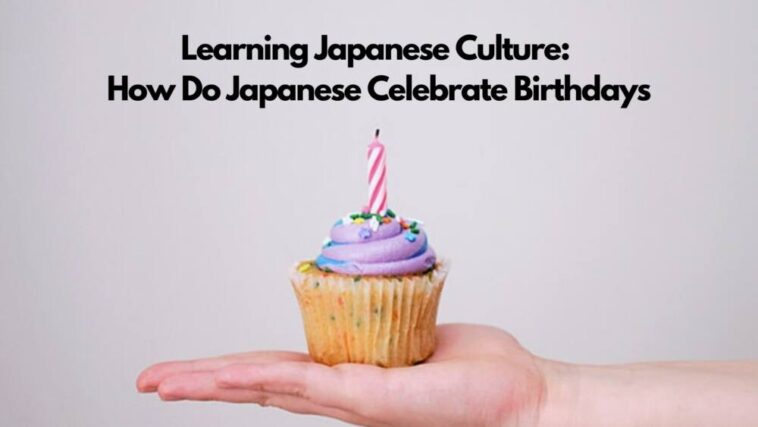Our learning japanese culture series presents how Japanese celebrate birthdays. Read on to find out about birthday celebration traditions in Japan
Forget elaborate parties! In Japan, birthdays are a more subtle affair. We’ll explore how families gather for low-key celebrations, the importance of cake, and a fascinating twist on adult birthday traditions. Discover a unique way the Japanese mark another year older.
Page Contents
How Japanese Celebrate Birthdays
In Japan, birthdays are celebrated with traditions such as a birthday cake, gift-giving, and family gatherings. Some unique customs include observing unlucky years called Yakudoshi and celebrating according to the 24 Solar Terms. Children often have character-themed parties, and some people visit shrines or temples for blessings. Social media has also become a popular platform for birthday greetings.
Japanese Birthday Traditions
Birthdays hold a special significance in Japanese culture, as they provide an opportunity to express love, gratitude, and appreciation for one another. While some traditional Japanese customs have been influenced by Western practices, there are still unique aspects that make Japanese birthday celebrations distinctive.

Here are some of the common birthday traditions in Japan:
- Coming-of-Age Celebration
In Japan, reaching the age of 20 is a significant milestone. Young people celebrate this occasion during the Coming-of-Age Day (Seijin no Hi) in January. On this day, those who turned 20 in the previous year dress in traditional attire called furisode (long-sleeved kimono) and attend ceremonies held at local government offices. They participate in speeches, receive gifts, and celebrate their official entry into adulthood.
- Omedetou Gozaimasu
“Omedetou Gozaimasu” is the phrase used to say “Happy Birthday” in Japanese. It is common to hear friends, family members, and colleagues wishing someone a happy birthday using this phrase. Additionally, people may exchange birthday cards or send messages to express their well wishes.
- Birthday Parties
In recent years, Western-style birthday parties have become more popular in Japan, especially for children. These parties often include decorations, balloons, games, and a birthday cake. Children might invite their friends over to celebrate, and parents may organize games or hire entertainers such as clowns or magicians.
The birthday child will typically blow out the candles on the cake while everyone sings the “Happy Birthday” song.
- Yakudoshi
In Japanese folklore, certain ages are considered unlucky or prone to misfortune. One such belief is called “yakudoshi.” It is believed that men have three unlucky ages (25, 42, and 61) and women have four (19, 33, 37, and 61). On these birthdays, some people may take extra care to ward off bad luck by performing rituals or visiting shrines for blessings.
- Red and White
In Japan, it is common to associate certain colors with celebratory events. Red and white are considered auspicious colors, symbolizing joy and purity. Birthday decorations, including wrapping paper, balloons, and flowers, often feature these colors.
Similarly, the traditional Japanese confectionery called “wagashi” is often made in red and white designs for birthdays and other special occasions.
- Birthday Gifts
Giving gifts on birthdays is also a common practice in Japan. Popular gift choices include clothing, accessories, cosmetics, books, or items related to the recipient’s hobbies or interests. It is customary to present gifts in beautifully wrapped packages and to include a heartfelt note expressing good wishes and gratitude.
- Longevity Celebrations
In Japan, reaching significant age milestones is celebrated with great enthusiasm. For example, when someone turns 60, they celebrate their “kanreki” or “koki.” This occasion marks the completion of one full life cycle in the traditional Chinese zodiac. It is common to celebrate with family gatherings, feasts, and gift-giving to honor the person’s longevity and wisdom.
- Related: What Japanese Do in New Year
- Related: How Japanese Celebrate Christmas
- Related: How Japanese Names Work
Modern Japanese Birthday Celebrations
These days, mainly children’s birthdays are celebrated in Japan. For the birthdays, parents organize a small gathering and make the kids cut cakes. The cake that is got for birthdays is usually a white Victoria sponge with cream. The number of candles used on the cake depends on the age that the child is turning.
The Happy Birthday song is also sung in English in the dark. When the song is sung, the child has to blow the candles. The birthday song is sung in English because there is no Japanese equivalent. This ritual is quite common to the way birthdays are celebrated in the west.
However, this does not mean that the adults in Japan have their own way of celebrating their birthdays and enjoying this day. For the adults, the friends organize a party for the birthday boy or girl. This is a customary ritual.
The bill for this celebration is completely paid for by the friends and family who have organized the party. This completely makes sense because it then becomes a gift for the birthday girl or body.
Related: How Japanese Show Respect
How kids’ birthdays celebrated in Japan?
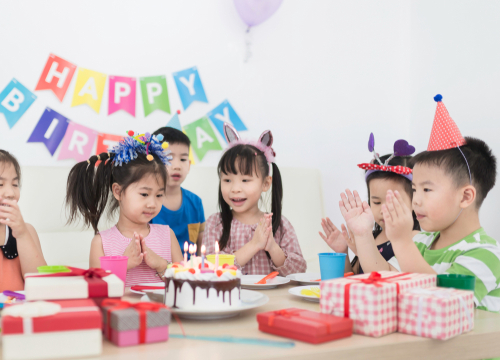
Children are the luckiest when it comes to celebrating birthdays. Parents ensure that the kids really enjoy their special day. A small gathering is organized for the birthday child. The celebration is complete with cakes and candles. Depending on the likes of the child or parent, the cake is designed – it can be quite simple or quite elaborate. A mandatory happy birthday song is sung when the child is cutting the cake with the lights all dimmed out. And as it happens in western culture, the parents give the child a gift. You will also see that there are several birthday parties that are quite extravagant.
Japanese child’s first birthday party
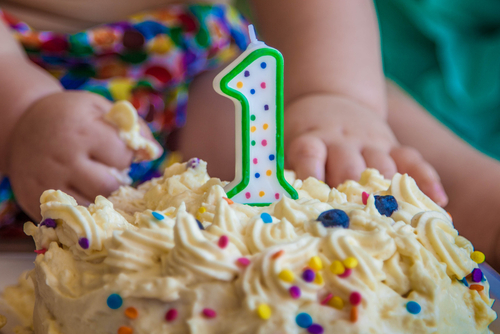
When a Japanese child turns one, the birthday tradition is quite different from the one you see in America. The Americans smash the cake on their child’s first birthday.
However, in Japan, children carry or step on a rice cake, which is known as issho mochi. The rice cake weighs about four pounds and is the child’s introduction to the tradition of birthday celebrations.
This tradition is considered to bring in good luck. Yet another first birthday tradition that is followed in Japan is called the erabitori. This is a tradition that lets the child choose an item that would signify his or her future.
For instance, if a child chooses a calculator, it could mean that the child has excellent future business powers.
Related: How Japanese Call Their Parents
The Japanese tradition of Shichi-Go-San
The literal translation of Shichi-Go-San is seven, five, and three. This is a Japanese tradition in which parents take their seven-year-old girls, five-year-old boys, and both sexes of three-year-old children to a shrine.
These children get a thousand-year-old candy called Chitose ame as a birthday gift. On this day, these birthday children wear traditional Japanese dress. This is a tradition that is done on the 15th of November, which is considered to be an auspicious day. This tradition ensures the good health and growth of children.
Related: How Japanese Write Dates
How do adults celebrate their birthdays in Japan?

While the children get quite an extravagant party, the birthday celebration of adults is quite a low-key affair. The friends or family members may organize a birthday party, and they have to pay for everything.
The birthday boy or girl does not pay for anything, and this birthday celebration is like a gift for them. However, this celebration is not done on the day of the birthday, but rather around it.
Related: What Japanese Say Before Eating
How Japanese couples celebrate their birthdays?
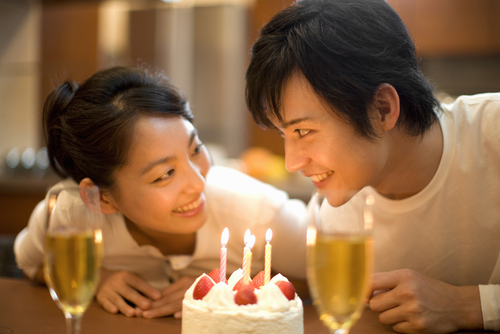
On the day when a Japanese adult is born, they want to celebrate it with their significant others. This significant other could be their spouse or girlfriend/boyfriend. On this day, couples go out together and exchange gifts. What they do on this special day depends from person to person. They may also decide to go for a romantic dinner or have a day trip.
However, you do not have to spend extravagantly on this celebration. A simple cake and a card can make the day very special. There are also several affordable experiences you can do on this day to make the birthday a special one. You can go for a romantic walk, a nice meal, or a day trip. All of these can make the day extra special.
Some special adult birthday traditions in Japan
Just like there are some special birthdays for adults in America, Japan has them too. In the US, 18 and 21 are considered to be coming-of-age birthdays. For the Japanese, 20 is the age. Here are some special Japanese birthday traditions.
20th birthday tradition in Japan
When you reach the age of 20, you are considered an adult in Japan. This birthday is celebrated on the second Monday of January. The coming-of-age ceremony that is performed on this day is known as seijin no hi.
On this day, the government sends out official letters to those who are turning 20. Women, to mark this day, wear a special kimono. The celebration includes speeches and performances, which are attended by every 20-year-old.
60th birthday tradition in Japan
Another important birthday celebration in Japan is when an adult turns 60. This is a very significant day as it symbolizes the completion of a zodiac cycle and rebirth. On this day, the family hosts a return calendar birthday. For this special occasion, the birthday man or woman includes a special cushion, red sleeveless vest, and fan as a part of their attire. You will also see decorations such as white cranes or red turtles on the cake.
77th birthday tradition in Japan
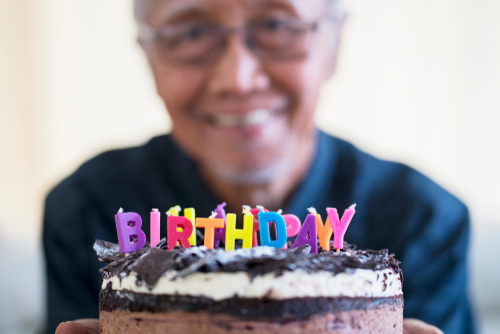
Turning 77 is yet another special birthday celebration in Japan. Why you may ask? It is because this is considered to be an age where you are joyous and happy. Anybody who has lived to see this age is quite fortunate. It is considered a rite of passage or ga no iwai.
88th birthday tradition in Japan
The 88th birthday celebration is also known as ‘rice’ birthday because the character of 88 looks so similar to rice grains. The reason why the Japanese celebrate their 88th birthdays is that rice is seen as the symbol of goodness. The traditional gifts that mark this day include a walking stick with a pigeon.
99th birthday tradition in Japan
The 99th birthday celebration in Japan is known as the ‘white’ birthday. Because it is called the white birthday, you will see that most guests wear white and give traditional Japanese longevity birthday gifts.
What do Japanese eat on birthday?
Japanese people eat a variety of foods on their birthdays, but some of the most popular dishes include:
- Sekihan: This is a red rice dish that is often served on special occasions, such as birthdays. It is made with red beans, which are believed to bring good luck.
- Mochi: This is a type of rice cake that is often served on birthdays. It is made with glutinous rice, which is pounded until it becomes soft and sticky. Mochi can be eaten plain, or it can be filled with sweet or savory ingredients.
- Tempura: This is a dish of seafood or vegetables that are dipped in batter and deep-fried. Tempura is often served with a dipping sauce made of soy sauce, mirin, and sake.
- Sushi: This is a Japanese dish of vinegared rice topped with seafood, vegetables, or other ingredients. Sushi is often served with wasabi and pickled ginger.
- Ramen: This is a Japanese noodle soup that is often served with pork, chicken, or vegetables. Ramen is a popular choice for a birthday meal because it is hearty and filling.
In addition to these dishes, Japanese people may also enjoy other foods on their birthdays, such as cake, ice cream, or fruit. The specific foods that are served on a birthday can vary depending on the family’s traditions and preferences.
What do Japanese people say for birthdays?
In Japanese, the phrase commonly used to say “Happy Birthday” is “お誕生日おめでとうございます” (O-tanjoubi omedetou gozaimasu). This phrase is a polite and formal way to express birthday greetings.
However, informally, friends and family members may use a more casual expression like “お誕生日おめでとう” (O-tanjoubi omedetou) or simply “誕生日おめでとう” (Tanjoubi omedetou) to wish someone a happy birthday.
It is also common for people to send written birthday greetings in the form of cards, messages, or social media posts. These messages often include expressions like “素敵な一年になりますように” (Subarashii ichinen ni narimasu you ni), which means “Wishing you a wonderful year ahead,” or “幸せな一年をお過ごしください” (Shiawase na ichinen o osugoshi kudasai), which means “May you have a happy year.”
These phrases and expressions convey well wishes, happiness, and good fortune to the birthday celebrant in the Japanese language and reflect the cultural emphasis on expressing appreciation and goodwill on birthdays.
Do Japanese celebrate two birthdays?
Yes, Japanese people celebrate two birthdays. The first is their official birthday, which is the day they were born. This is typically celebrated with a small gathering of family and friends, and may include a cake, gifts, and singing “Happy Birthday.” The second birthday is New Year’s Day. In the past, Japanese people considered everyone to be one year old on New Year’s Day, regardless of when they were born.
This tradition has largely died out, but some people still celebrate their New Year’s birthday as a way to mark the beginning of a new year.
Are birthdays big in Japan?
Birthdays are not as big of a deal in Japan as they are in some other countries, such as the United States. However, they are still celebrated, and the way in which they are celebrated can vary depending on the age of the person and the occasion.
For young children, birthdays are often celebrated with a party at home or at a party venue. The party may include games, activities, food, and cake. Birthday parties for children are often planned by the parents, but the child may be involved in the planning process.
For adults, birthdays are often celebrated with a dinner out or a small gathering of friends. Birthday celebrations for adults are typically less formal than birthday parties for children.
There are also some special birthdays that are celebrated in Japan with more fanfare. For example, the 20th birthday is a major milestone, and it is often celebrated with a large party. The 60th birthday is also a major milestone, and it is often celebrated with a formal ceremony.
Overall, birthdays are celebrated in Japan, but they are not as big of a deal as they are in some other countries. The way in which birthdays are celebrated can vary depending on the age of the person and the occasion.
Japanese birthday traditions!
Did you find differences in the way the Japanese celebrate their birthdays and the various traditions they follow? If you live in Japan or have somebody special who lives in Japan, do not forget these birthday customs and traditions. Happy birthday to you!
Also Read


